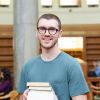
Alex Avis
- Course: BA History (Industrial)
Which History modules have you particularly enjoyed studying, and why?
In my second year, Dr Rafe Hallett’s Heretics, Witches and Conspirators: Toleration and Persecution in Early Modern Europe and Dr Claire Eldridge’s Colonial Encounters: France and its Empire, 1830-1945 were two modules I really enjoyed studying. Both of the tutors were enthusiastic and a joy to be taught by, and the topic areas were thoroughly engaging. Furthermore, the modules also satisfied a desire to learn more about both historical interests that I had always had yet had never had the opportunity to study, and topics that I was familiar with but from an entirely different angle. For example, I have always been interested in the persecution and demonisation of minority groups throughout history, and Dr Hallett’s module presented the perfect opportunity to explore this in more depth. Dr Eldridge’s module, on the other hand, examined imperialism and colonialism but from the French standpoint as opposed to the British, with which I was already familiar. Two excellent modules with two excellent tutors, both of which I would highly recommend to any second-year history student.
Which Discovery Modules have you studied, and how do you feel they have enhanced your time in Leeds?
In both my first and second years I chose a language discovery module, taking Beginner’s German in my first year and Beginner’s French in my second year. In my second year I also chose a short module on careers and another one on business. All four have enhanced my time in Leeds by providing the opportunity to meet new people and study topics that I’m interested in that lie outside the School of History. The careers module has been particularly useful as it inspired me to take a work placement in my third year, which is one of the most valuable experiences I’ve had while at university.
What would you say about the library and study facilities at the University?
The library and study facilities at the University of Leeds are world class with an enormous wealth of materials to support any research interest.
Please tell us more about your work placement year. How did you set up the year and what support did you receive from the university? What was the highlight of the year? How do you feel the placement will enhance your future employability?
For my work placement year, I worked as a Business Development Executive in the sponsorship team of a B2B media company called Marketforce based in London. I found the vacancy on the University’s careers site (mycareer.leeds.ac.uk/home.html) I also received regular support from my placement tutor who was always on hand to answer any questions and help solve any problems I may have had. The University didn’t just send me out on my own into the world of work with no support; they were very much in touch throughout the experience.
I believe that my placement experience will prove invaluable for my future employability. Not only have I been able to develop new skills and enhance existing ones that will make me more competitive in the job market once I graduate, but I have also created a professional network of people that I will be able to go to in the future for opportunities and advice.
What activities have you been involved in outside of your course and what have you got out of being involved?
I have been a member of the University’s men’s lacrosse team since my first year and played touch rugby in my second year. My aim for my final year is to try out lots of new activities while I still have the opportunity to do so. Being involved in societies outside of my course has been very important as it has allowed me to meet so many new people, pick up new skills and enjoy new and memorable experiences that have helped shape my time at university. There’s something for everyone at the University of Leeds, and it’s all about stepping out of your comfort zone and trying something different!
What would you say about Leeds as a city and how do you think it has helped you make the most of your time here?
Leeds as a city is great, especially for those like me who have never lived in a city before. Though small in comparison to other major cities, Leeds is packed full of things to do and see and all in walking distance of your home or the University. It’s helped me make the most of my time here by providing so many opportunities to socialise with other students, particularly the city’s nightlife.
Do you have any comments about the support you receive from the School of History?
Students are well looked after in the School of History. The staff are always on hand to answer queries and offer guidance, whether personal, academic or professional. The school is always organising high-quality events to help you in every aspect of your university experience and post-university career, from enhancing your research and writing skills to employability and job searching.
What do you plan to do once you’ve finished your course, and how do you think the skills and knowledge you’ve developed at Leeds will help with these plans?
Once I finish my course, my plan is to get on a graduate scheme, preferably in an operational, digital or creative position, as, after having completed my work placement and throughout my time at Leeds, I believe it is in these types of roles that my skills would be best suited. The skills and knowledge that I’ve developed here have given me an understanding of not only where my strengths and interests lie, but what type of opportunities there are available for me in the world of employment. The University of Leeds also has excellent links with employers which will help hugely in this regard.

